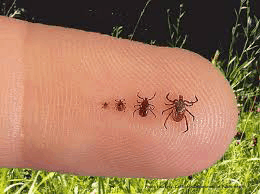This time of year is full of reports of ticks bites, rashes, and worries about diseases. As is becoming more and more evident by the day, ticks are very active and very hungry for their blood meal at this time of year.
The Lyme Action Network offers some common tips, and some little known facts, to help you stay safe and healthy.
1. If you take an attached tick off your body, save it! Do not discard it. Rather, put it in a zip lock bag and send it to the University of Massachusetts Zoology Lab for identification (209 Fernald Hall, 270 Stockbridge Rd., University of Massachusetts, Amherst, MA 01003). The lab will report back to you in about a week to let you know if the tick was carrying pathogens, and if it had a chance to feed on its host. This information will help you and your doctor decide on the most sensible next course of action. For more information visit www.tickdisease.org. This service costs $50 for three tests: Lyme, babesia microti, and anaplasma.
2. Prevention is the best course of action. Spray your clothes — not your skin — with permetherin. Permetherin kills ticks. You can store your permetherin-treated clothes in a plastic bag in your garage and reuse a few times before you wash and re-treat. Wear light colored clothing, tuck in your pant legs and shirt tails, wear a hat, and do a full-body tick check when you come indoors.
3. You can also throw throw your clothes in the dryer on hot for 10 minutes when you come in. The heat kills the ticks.
4. You may want to treat the perimeter of your property with permetherin spray, especially if you border wooded or grassy areas. (Do not use permetherin near streams, ponds, or other water.)
5. “Deet” is effective at repelling ticks, but it does not kill them. Other compounds, such as picaridin and natural products containing oils of lavender, geranium, and chrysanthemum also repel ticks.
6. If you have an attached tick, remove it as soon as you notice it. Using a “Tick Twister” removes it completely, painlessly and easily as it “twirls” the tick out of your skin. Using tweezers runs a high risk of squeezing the contents of the tick into your skin.
7. Do not believe the myth that a tick needs to be attached for 24-48 hours. You can get many diseases from ticks — some of them after a very short attachment. No definitive research has been done to determine how long it takes to transmit many of the co-infection pathogens, such as babesia, bartonella, anaplasma, ehrlichia, and others, but it is believed to be a short period of time. The Powhassan virus can be transmitted in 15 minutes!
8. It is also believed that if a tick attempts to feed on an animal (like your dog) treated with an anti-tick product like Frontline or Advantix, it tastes the repellent and backs out of the animal and then resumes its feeding process on a human. It is best to assume that there is no minimum “safe” time if you are bitten by a tick.
9. Know your ticks. There are several different species of tick in this region, and the ticks look different as they progress through their lives. The Tick Encounter Resource Center at the University of Rhode Island has a very good tick identification chart at www.tickencounter.org.
10. While we have been principally concerned about the deer tick, it’s not the only tick that can transmit diseases. The Lone Star tick has been reported in eastern New York. This is an aggressive tick, and can carry a variety of diseases. It is identified by the white spot on its back.
For more information visit lymeactionnetwork.org.
Bitten by a tick? Save it and ship it!




